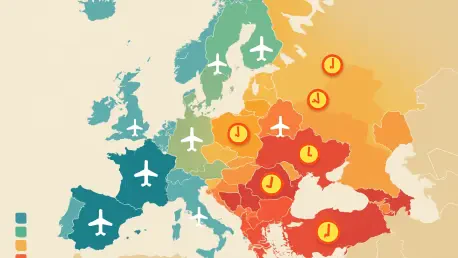In a year marked by unprecedented travel demand across Europe, millions of passengers have found themselves stranded, delayed, or frustrated due to persistent air traffic control (ATC) disruptions, with reports from one of the continent’s largest airlines, Ryanair, revealing a staggering figure of over 21 million travelers impacted by delays or cancellations so far this year. The summer months, typically a peak time for vacations and business trips, have been particularly chaotic, with systemic failures in ATC services casting a shadow over the industry. This alarming trend raises critical questions about the management and accountability of ATC systems in several key European Union (EU) countries. As airlines bear the brunt of passenger dissatisfaction and financial losses, the spotlight falls on governments and regulatory bodies for their apparent inability to address these ongoing issues. The following discussion delves into the root causes of these disruptions and explores why certain nations struggle while others succeed.
Disparities in ATC Performance Across Europe
The performance of ATC services across Europe paints a starkly uneven picture, with some countries managing air traffic seamlessly while others falter under pressure. Ryanair’s latest data, compiled in an August report dubbed the “ATC Delays League,” highlights the worst offenders, including France, Spain, Germany, the UK, and Greece. Among these, France stands out for the sheer scale of its disruptions, with nearly 49,351 delayed flights affecting over 8.8 million passengers in the first eight months of the year. Such figures underscore a troubling reality for travelers relying on these major hubs, where inefficiencies translate into hours of lost time and missed connections. The ripple effects extend beyond individual passengers, impacting airlines’ schedules and operational costs. This consistent underperformance in key nations reveals a deeper issue of prioritization and resource allocation that continues to plague the region’s busiest airspaces.
In contrast, several smaller European nations demonstrate that effective ATC management is not an unattainable goal. Countries like Bulgaria, Denmark, Slovakia, the Netherlands, and Belgium have earned praise for their minimal delays and well-coordinated services. These nations manage to maintain smooth operations even during high-traffic periods, offering a blueprint for success that others seem to ignore. The disparity suggests that the problem lies not in the complexity of air traffic itself but in the commitment to robust systems and adequate staffing. For passengers, this means a frustrating lottery of travel experiences depending on the country of departure or arrival. For airlines, it highlights a glaring lack of accountability among underperforming ATC providers, many of which operate as state-protected monopolies with little incentive to improve. This imbalance in performance across the continent fuels calls for a unified standard of excellence in air traffic management.
Systemic Failures and Calls for Reform
At the heart of the ATC crisis lies a systemic failure compounded by chronic mismanagement and staffing shortages in several major countries. Ryanair’s leadership, including CEO Michael O’Leary, has publicly criticized the EU Commission and national transport ministers for turning a blind eye to these issues. Despite the substantial fees airlines and passengers pay for ATC services, the return on investment appears dismal in nations where delays are routine. O’Leary argues that up to 90% of disruptions could be avoided with proper staffing and efficient operations, pointing to successful models in smaller countries as evidence. The frustration stems from a perceived lack of oversight, where failing ATC providers face no real consequences for their shortcomings. This ongoing neglect not only disrupts travel plans but also erodes trust in the broader aviation infrastructure across the region.
Beyond the operational challenges, there is a growing tension between airlines, passengers, and regulatory bodies over who bears responsibility for these disruptions. Ryanair has taken a proactive stance, urging travelers to join a campaign aimed at pressuring EU leaders and transport ministers for meaningful reforms. The airline’s initiative seeks to channel public frustration into a collective demand for change, emphasizing that the current system disproportionately harms passengers and carriers while shielding ATC providers from accountability. The narrative emerging from this conflict is one of a broken framework, where political will to enact change remains elusive despite clear evidence of the problem’s scale. As delays continue to mount, the call for a restructured approach to ATC management grows louder, with stakeholders advocating for stricter oversight and penalties for consistent underperformance.
Pathways to a More Reliable Future
Looking back, the persistent failures of ATC systems in several EU countries revealed a fractured landscape where inefficiencies overshadowed the potential for seamless travel. The stark contrast between nations like France, with its massive delays, and others like Denmark, with minimal disruptions, underscored that solutions were within reach yet remained unimplemented in critical regions. Reflecting on the data, over 21 million passengers bore the brunt of these shortcomings, often during peak travel seasons when reliability mattered most.
Moving forward, actionable steps emerged as a priority to address this crisis. Governments and EU authorities were urged to impose stricter accountability measures on underperforming ATC services, potentially tying funding to performance metrics. Additionally, investing in staff training and recruitment could alleviate chronic shortages that plagued major hubs. Collaborative efforts between airlines and policymakers also held promise, fostering a unified push for systemic reform. Ultimately, the path to restoring trust in European air travel hinged on a commitment to prioritize passenger experience over bureaucratic inertia.









